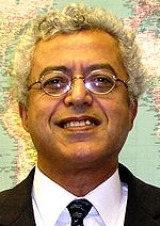
Nagy Habib
Encyclopedia
Nagy Habib is a Professor
of Surgery
based in London
.
Professor of Hepto-biliary Surgery
Division of Surgery, Oncology, Reproductive Biology and Anaesthetics,
Imperial College London
Born and educated in Cairo
, Egypt
, Habib completed his medical training in the UK. Habib specialised in liver
surgery and was appointed Consultant at Hammersmith Hospital, in 1989. Alongside surgery at Hammersmith Hospital, Imperial College Healthcare NHS Trust, Habib has had ongoing research in stem cells and gene therapy
at Imperial College. Habib was appointed Professor of Hepatobiliary Surgery in 2003, and Chair of Surgery in 2007. In 2007 Habib was appointed Pro-Rector of Commercial Affairs.
Professor Habib has published over 200 papers in peer reviewed journals and sits on the editorial review panels of the European Journal of Cancer and the Annals of the Royal College of Surgeons of England. Habib is one of the proponents of adult stem cell
research, in the treatment of advanced cases of cancer http://news.bbc.co.uk/1/hi/health/4573453.stm.
Professor Habib revolutionised liver surgery by adopting the use of radio frequency
in liver resections, allowing tumours to be removed with minimal loss of blood. The technique has been published in the Annals of Surgery and elsewhere and later commercialised by Professor Habib through Emcision http://www.emcision.com/, a private company he founded. The Habib 4X http://www.angiodynamics.com/pages/products/habib.asp open and laparoscopic electrosurgical devices are distributed by Angiodynamics, Inc. The devices have been adopted for distal pancreatectomy, partial nephrectomy, and myeomectomy procedures.
Professor
A professor is a scholarly teacher; the precise meaning of the term varies by country. Literally, professor derives from Latin as a "person who professes" being usually an expert in arts or sciences; a teacher of high rank...
of Surgery
Surgery
Surgery is an ancient medical specialty that uses operative manual and instrumental techniques on a patient to investigate and/or treat a pathological condition such as disease or injury, or to help improve bodily function or appearance.An act of performing surgery may be called a surgical...
based in London
London
London is the capital city of :England and the :United Kingdom, the largest metropolitan area in the United Kingdom, and the largest urban zone in the European Union by most measures. Located on the River Thames, London has been a major settlement for two millennia, its history going back to its...
.
Professor of Hepto-biliary Surgery
Division of Surgery, Oncology, Reproductive Biology and Anaesthetics,
Imperial College London
Imperial College London
Imperial College London is a public research university located in London, United Kingdom, specialising in science, engineering, business and medicine...
Born and educated in Cairo
Cairo
Cairo , is the capital of Egypt and the largest city in the Arab world and Africa, and the 16th largest metropolitan area in the world. Nicknamed "The City of a Thousand Minarets" for its preponderance of Islamic architecture, Cairo has long been a centre of the region's political and cultural life...
, Egypt
Egypt
Egypt , officially the Arab Republic of Egypt, Arabic: , is a country mainly in North Africa, with the Sinai Peninsula forming a land bridge in Southwest Asia. Egypt is thus a transcontinental country, and a major power in Africa, the Mediterranean Basin, the Middle East and the Muslim world...
, Habib completed his medical training in the UK. Habib specialised in liver
Liver
The liver is a vital organ present in vertebrates and some other animals. It has a wide range of functions, including detoxification, protein synthesis, and production of biochemicals necessary for digestion...
surgery and was appointed Consultant at Hammersmith Hospital, in 1989. Alongside surgery at Hammersmith Hospital, Imperial College Healthcare NHS Trust, Habib has had ongoing research in stem cells and gene therapy
Gene therapy
Gene therapy is the insertion, alteration, or removal of genes within an individual's cells and biological tissues to treat disease. It is a technique for correcting defective genes that are responsible for disease development...
at Imperial College. Habib was appointed Professor of Hepatobiliary Surgery in 2003, and Chair of Surgery in 2007. In 2007 Habib was appointed Pro-Rector of Commercial Affairs.
Professor Habib has published over 200 papers in peer reviewed journals and sits on the editorial review panels of the European Journal of Cancer and the Annals of the Royal College of Surgeons of England. Habib is one of the proponents of adult stem cell
Adult stem cell
Adult stem cells are undifferentiated cells, found throughout the body after embryonic development, that multiply by cell division to replenish dying cells and regenerate damaged tissues...
research, in the treatment of advanced cases of cancer http://news.bbc.co.uk/1/hi/health/4573453.stm.
Professor Habib revolutionised liver surgery by adopting the use of radio frequency
Radio frequency
Radio frequency is a rate of oscillation in the range of about 3 kHz to 300 GHz, which corresponds to the frequency of radio waves, and the alternating currents which carry radio signals...
in liver resections, allowing tumours to be removed with minimal loss of blood. The technique has been published in the Annals of Surgery and elsewhere and later commercialised by Professor Habib through Emcision http://www.emcision.com/, a private company he founded. The Habib 4X http://www.angiodynamics.com/pages/products/habib.asp open and laparoscopic electrosurgical devices are distributed by Angiodynamics, Inc. The devices have been adopted for distal pancreatectomy, partial nephrectomy, and myeomectomy procedures.

